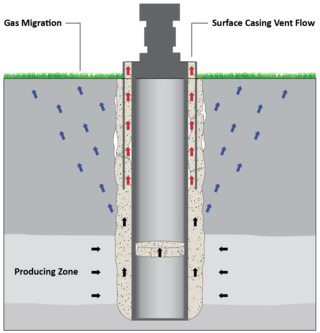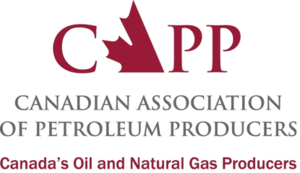
Oil sands, tar sands, crude bitumen, or bituminous sands, are a type of unconventional petroleum deposit. Oil sands are either loose sands or partially consolidated sandstone containing a naturally occurring mixture of sand, clay, and water, soaked with bitumen, a dense and extremely viscous form of petroleum.

The Athabasca oil sands, also known as the Athabasca tar sands, are large deposits of bitumen, a heavy and viscous form of petroleum, located in northeastern Alberta, Canada. These reserves are one of the largest sources of unconventional oil in the world, making Canada a significant player in the global energy market.
Heavy crude oil is highly viscous oil that cannot easily flow from production wells under normal reservoir conditions.

Petroleum production in Canada is a major industry which is important to the overall economy of North America. Canada has the third largest oil reserves in the world and is the world's fourth largest oil producer and fourth largest oil exporter. In 2019 it produced an average of 750,000 cubic metres per day (4.7 Mbbl/d) of crude oil and equivalent. Of that amount, 64% was upgraded from unconventional oil sands, and the remainder light crude oil, heavy crude oil and natural-gas condensate. Most of the Canadian petroleum production is exported, approximately 600,000 cubic metres per day (3.8 Mbbl/d) in 2019, with 98% of the exports going to the United States. Canada is by far the largest single source of oil imports to the United States, providing 43% of US crude oil imports in 2015.
The Ministry of Energy is a Cabinet-level agency of the government of the Canadian province of Alberta responsible for coordinating policy relating to the development of mineral and energy resources. It is also responsible for assessing and collecting non-renewable resource (NRR) royalties, freehold mineral taxes, rentals, and bonuses. The Alberta Petroleum Marketing Commission, which is fully integrated with the Department of Energy within the ministry, and fully funded by the Crown, accepts delivery of the Crown's royalty share of conventional crude oil and sells it at the current market value. The current ministry was formed in 1986, but ministries with other names dealing with energy resources go back to the Ministry of Lands and Mines in 1930.
Steam-assisted gravity drainage is an enhanced oil recovery technology for producing heavy crude oil and bitumen. It is an advanced form of steam stimulation in which a pair of horizontal wells are drilled into the oil reservoir, one a few metres above the other. High pressure steam is continuously injected into the upper wellbore to heat the oil and reduce its viscosity, causing the heated oil to drain into the lower wellbore, where it is pumped out. Dr. Roger Butler, engineer at Imperial Oil from 1955 to 1982, invented the steam assisted gravity drainage (SAGD) process in the 1970s. Butler "developed the concept of using horizontal pairs of wells and injected steam to develop certain deposits of bitumen considered too deep for mining". In 1983 Butler became director of technical programs for the Alberta Oil Sands Technology and Research Authority (AOSTRA), a crown corporation created by Alberta Premier Lougheed to promote new technologies for oil sands and heavy crude oil production. AOSTRA quickly supported SAGD as a promising innovation in oil sands extraction technology.
The Canadian Centre for Energy Information (CCEI) is a Canadian federal government website and portal that was announced on May 23, 2019.

Canada has access to all main sources of energy including oil and gas, coal, hydropower, biomass, solar, geothermal, wind, marine and nuclear. It is the world's second largest producer of uranium, third largest producer of hydro-electricity, fourth largest natural gas producer, and the fifth largest producer of crude oil. In 2006, only Russia, the People's Republic of China, the United States and Saudi Arabia produce more total energy than Canada.

The fossil fuels lobby includes paid representatives of corporations involved in the fossil fuel industry, as well as related industries like chemicals, plastics, aviation and other transportation. Because of their wealth and the importance of energy, transport and chemical industries to local, national and international economies, these lobbies have the capacity and money to attempt to have outsized influence on governmental policy. In particular, the lobbies have been known to obstruct policy related to environmental protection, environmental health and climate action.

Natural gas has been used almost as long as crude oil in Canada, but its commercial development was not as rapid. This is because of special properties of this energy commodity: it is a gas, and it frequently contains impurities. The technical challenges involved to first process and then pipe it to market are therefore considerable. Furthermore, the costs of pipeline building make the whole enterprise capital intensive, requiring both money and engineering expertise, and large enough markets to make the business profitable.
Environmental issues in Canada include impacts of climate change, air and water pollution, mining, logging, and the degradation of natural habitats. As one of the world's significant emitters of greenhouse gasses, Canada has the potential to make contributions to curbing climate change with its environmental policies and conservation efforts.
Cenovus Energy Inc. is a Canadian integrated oil and natural gas company headquartered in Calgary, Alberta. Its offices are located at Brookfield Place, having completed a move from the neighbouring Bow in 2019.
Western Canadian Select (WCS) is a heavy sour blend of crude oil that is one of North America's largest heavy crude oil streams and, historically, its cheapest. It was established in December 2004 as a new heavy oil stream by EnCana, Canadian Natural Resources, Petro-Canada and Talisman Energy. It is composed mostly of bitumen blended with sweet synthetic and condensate diluents and 21 existing streams of both conventional and unconventional Alberta heavy crude oils at the large Husky Midstream General Partnership terminal in Hardisty, Alberta. Western Canadian Select—the benchmark for heavy, acidic crudes—is one of many petroleum products from the Western Canadian Sedimentary Basin oil sands. Calgary-based Husky Energy, now a subsidiary of Cenovus, had joined the initial four founders in 2015.

The Alberta Energy Regulator (AER) is a Canadian crown corporation responsible for regulating the development of energy resources in Alberta. Headquartered in Calgary, Alberta, the AER's mandate under the Responsible Energy Development Act (REDA) since 2013 is to provide safe, efficient, orderly, and environmentally responsible development of energy resources in the province.

Fracking in Canada was first used in Alberta in 1953 to extract hydrocarbons from the giant Pembina oil field, the biggest conventional oil field in Alberta, which would have produced very little oil without fracturing. Since then, over 170,000 oil and gas wells have been fractured in Western Canada. Fracking is a process that stimulates natural gas or oil in wellbores to flow more easily by subjecting hydrocarbon reservoirs to pressure through the injection of fluids or gas at depth causing the rock to fracture or to widen existing cracks.
Kathleen Sendall is a Canadian engineer. In 2005, she served as president of the Canadian Academy of Engineering. Throughout her career, which began in Alberta's oil and gas industry, she has held technical and executive positions and has actively promoted the participation of women in the profession of engineering. She is a member of the Order of Canada.

Orphan wells in Alberta, Canada are inactive oil or gas well sites that have no solvent owner that can be held legally or financially accountable for the decommissioning and reclamation obligations to ensure public safety and to address environmental liabilities.
The Canadian province of Alberta faces a number of environmental issues related to natural resource extraction—including oil and gas industry with its oil sands—endangered species, melting glaciers in banff, floods and droughts, wildfires, and global climate change. While the oil and gas industries generates substantial economic wealth, the Athabasca oil sands, which are situated almost entirely in Alberta, are the "fourth most carbon intensive on the planet behind Algeria, Venezuela and Cameroon" according to an August 8, 2018 article in the American Association for the Advancement of Science's journal Science. This article details some of the environmental issues including past ecological disasters in Alberta and describes some of the efforts at the municipal, provincial and federal level to mitigate the risks and impacts.
Andrew Leach is a Canadian energy and environmental economist and a contributing writer to a number of Canadian news outlets including The Globe and Mail, and Maclean's. His research areas span energy and environmental economics—including topics such as oil sands regulation, clean energy innovations, with a specific focus on climate change policies.
The Canadian Energy Centre Limited (CEC), also commonly called the "Energy War Room", is an Alberta provincial corporation mandated to promote Alberta's energy industry and rebut "domestic and foreign-funded campaigns against Canada's oil and gas industry". The creation of an organization to promote Alberta's oil and gas industries was a campaign promise by United Conservative Party leader Jason Kenney during the 2019 Alberta general election. After winning a majority of seats in the election, Kenney's government inaugurated the CEC with a $2.84 million budget in December 2019. The CEC originally had an annual budget of CA$30 million which was decreased to $CA12 million. The CEC has been the subject of several controversies since its establishment, including accusations of plagiarizing logo designs. The CEC attracted widespread media attention when it launched a campaign against the Netflix animated children's movie Bigfoot Family because it cast Alberta's oil and gas industry in a negative light.






